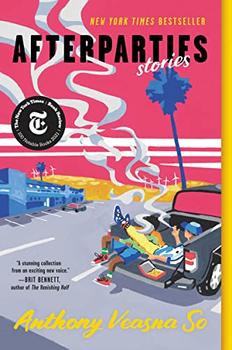Summary | Excerpt | Reading Guide | Reviews | Beyond the book | Read-Alikes | Genres & Themes | Author Bio

Fiction
by Jocelyn Nicole JohnsonIn the incendiary opening story of My Monticello, Jocelyn Nicole Johnson's debut collection, a father is addressing his college-aged son, with whom he has never had a relationship, or not a typical relationship at least. What seems at first to be a plaintive letter expressing remorse about his absence quickly blows the roof off the reader's expectations as the father explains that he had a child with a graduate student for the sole purpose of conducting an experiment: to discover whether or not Black boys and men have better opportunities in life now than they did when he was young. "You began as a thought fully formed and sprung from my head," he explains, going on to detail a litany of microaggressions he suffered in the early years of his career as a history professor and racial violence he witnessed or experienced as a child. The son — whom the narrator refers to as his "Control Negro," giving this story its title — is a talented athlete and bright student. He seems to be on a path toward success, until he is violently assaulted by a police officer. The end of the story shouldn't be spoiled, but "Control Negro" is a powerful, exceedingly dark demonstration of how the wounds of racial injustice trickle down from one generation to the next. This story is followed by four additional short stories that address similar themes through vastly different characters but that are more or less forgettable.
The second half of the book consists of the eponymous novella, a story about a young Black woman named Da'Naisha escaping with her boyfriend and some neighbors from a violent uprising of white nationalists in Virginia. They flee to Monticello, once Thomas Jefferson's home and plantation, now a museum dedicated to his legacy (see Beyond the Book). This includes the legacy of Jefferson as a slaveholder and father of multiple children with an enslaved woman named Sally Hemings. Johnson's Da'Naisha is a descendant of one of these children.
"My Monticello" unfolds as a dramatic and well-executed survival plot, but the story's most intriguing element is its thematic consideration of ownership and inheritance. Da'Naisha and the other survivors quickly establish a small, self-sustaining community at Monticello, and they are prepared to fight to keep it. But when they first arrive, Da'Naisha notes, "Back on First Street, and all our lives, we could reliably claim small things—my room, my sofa, my supper. But at the welcome pavilion, everything belonged to someone else, or to the past." This is the place where Da'Naisha's ancestors lived, where her great-great-great-grandmother's labor and body were appropriated. Monticello's headstone-less graveyard houses the remains of other ancestors, perhaps those of Da'Naisha's neighbors. Are they, therefore, entitled to this property?
The novella is also interested in the nonlinear path of time and progress surrounding Black life in America. There are those who believe racism is in the past, but there are also those who compartmentalize racism, many American liberals included — there is slavery racism; Jim Crow racism; there is modern, everyday racial discrimination; and there are occasional acts of racial violence that make the nightly news. Johnson refuses the reader the security of these historical frames. Instead, we see how the pulsing rage of white supremacy is a direct thread tying Black enslavement to the terrorism of today's alt-right, and that violence is not an anomaly but built into the very foundation of America.
The story falters in a few of the details. Johnson's dialogue can be awkward. A love triangle between Da'Naisha, her white boyfriend and a Black friend from the neighborhood lacks the subtlety and complexity of the other racial strands of the narrative.
Still, My Monticello is a bold and clever debut, a necessary read for "Control Negro" and the titular novella alone. It pulls no punches and provides no comfort. But Johnson's vivid characters will sit with you in the space of your unease, and likely remain with you for quite some time.
![]() This review was originally published in The BookBrowse Review in October 2021, and has been updated for the
October 2022 edition.
Click here to go to this issue.
This review was originally published in The BookBrowse Review in October 2021, and has been updated for the
October 2022 edition.
Click here to go to this issue.

If you liked My Monticello, try these:

by Anthony Veasna So
Published 2022
A vibrant story collection about Cambodian-American life - immersive and comic, yet unsparing - that offers profound insight into the intimacy of queer and immigrant communities.

The Office of Historical Corrections
by Danielle Evans
Published 2021
The award-winning author of Before You Suffocate Your Own Fool Self brings her signature voice and insight to the subjects of race, grief, apology, and American history.
Never read a book through merely because you have begun it
Click Here to find out who said this, as well as discovering other famous literary quotes!
Your guide toexceptional books
BookBrowse seeks out and recommends the best in contemporary fiction and nonfiction—books that not only engage and entertain but also deepen our understanding of ourselves and the world around us.